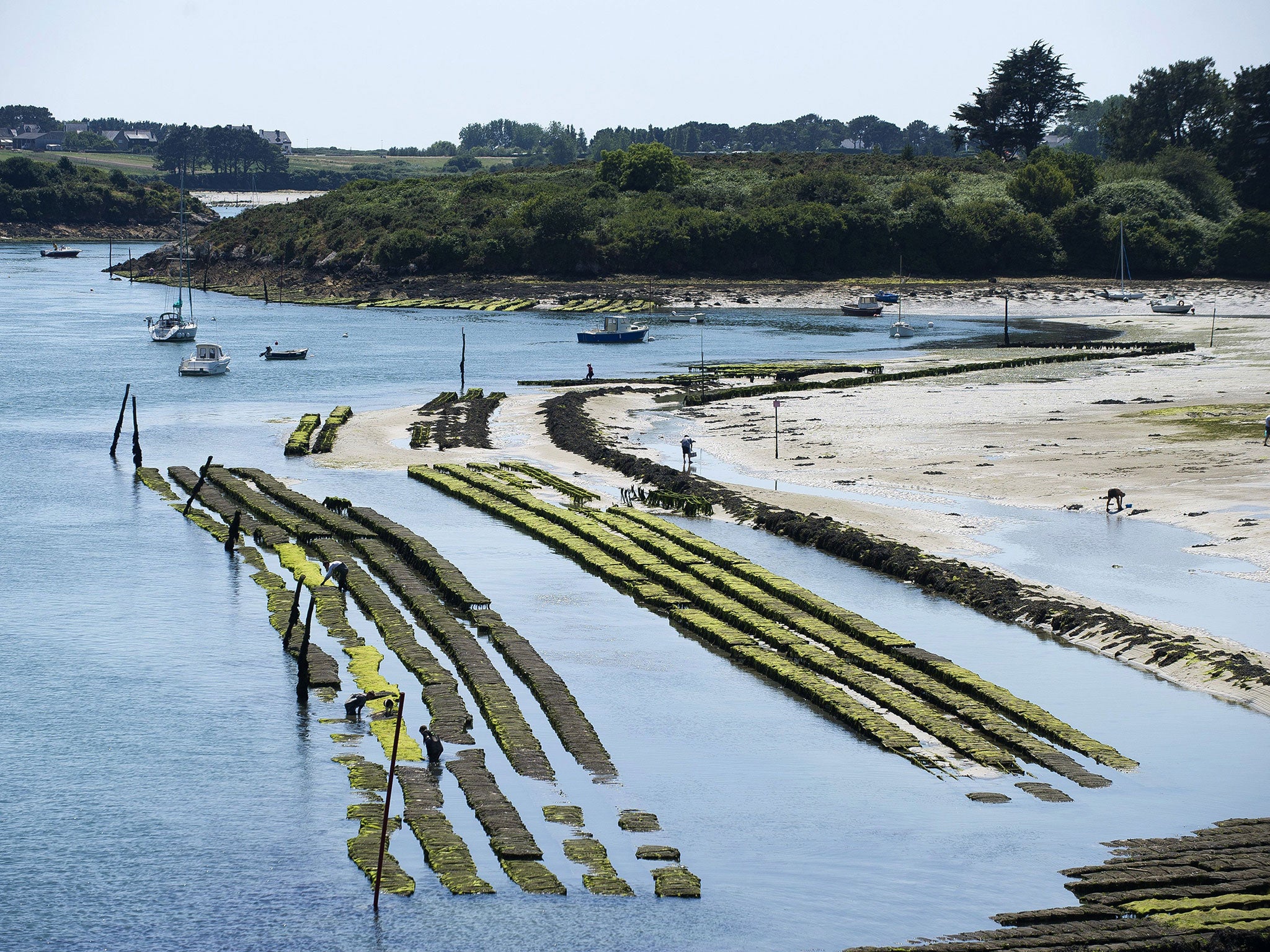Great mollusc meltdown leaves French all at sea
Shellfish farmers are dumping their ruined catches outside town halls over a lack of measures to combat declining sea stocks. But disastrous environmental changes may be out of authorities’ control

The jolly voicemail message on Cyril Pain’s mobile phone tells callers that if he doesn’t answer, “I must be out getting a suntan on my boat”. But this is no time for jokes in France’s oyster industry, the largest producer of the fleshy silver molluscs in Europe.
Mr Pain is the third generation of oyster farmers in his family on the Ile d’Oléron in south-western France where the bulk of the country’s shellfish production is harvested. He says that a combination of fatal disease, climate change and pollution has proved so devastating to the oyster beds that “the whole industry is threatened”.
On Tuesday, he joined about 300 shellfish farmers alarmed by the calamitous mortality rates, who dumped the shells of oysters, mussels and scallops outside administrative offices in La Rochelle.
They are complaining about what they say is a general indifference by the government and local politicians to the “slow death of estuary and coastal ecosystems”.
They say the deteriorating environmental conditions are to blame for the mass fatalities in their industry which has a €360m (£287m) turnover.
Output has been slashed by a third: the oyster industry, which used to produce 120,000 tons of the shellfish nationwide in 2008, can now only count on 80,000 tons. A total of 30,000 tons are produced in the Charente-Maritime department where Mr Pain is based.

The shellfish farmers in the department say their losses amount to €50m as a result of the crisis.
Mr Pain says that “for the past two years, there have been very high numbers of dead oysters, so we can’t keep up our production. Now it’s happening to scallops and mussels too.”
He says the shellfish farmers have mobilised to warn the authorities “because when they wake up it’ll be too late”.
According to Mr Pain, the oyster farmers can lose up to 85 per cent of juveniles and 60 per cent of adult oysters.
Jean-Pierre Baud, a researcher with Ifremer, the French Institute for Exploitation of the Sea, says that in 2008, the juveniles were hit by a herpes virus, Os-HV1, which killed 50 to 60 per cent.
That disease was particularly ruinous for the bay of Arcachon, where most of those hatcheries are located. But since 2012 the adult oyster population has been attacked by a bacterium known as vibrio aestuarianus.

“That’s a new phenomenon,” he said. The bacterium is harmless to consumers.
Researchers believe that this “murder weapon”, coupled with the effects of climate change and environmental factors including pesticides and the presence of tourists, are to blame for the damage to the shellfish in recent years. “Climate change isn’t just temperature but storms and rain which can affect the maritime environment [notably by diluting the salt water],” Mr Baud added.
Is the oyster, one of nature’s sentinels, an endangered species in France? Mr Baud doesn’t think so. “It’s the industry which has been weakened economically,” he says, noting that the oysters themselves have a capacity to adapt.
In the 1970s, the French oyster industry collapsed when the Portuguese oysters cultivated at the time succumbed to a viral disease, and were replaced by a more resistant Japanese variety, which now makes up 90 per cent of the world output.
Mr Pain said that friends of his had left France to try their luck in Ireland, but their stocks became diseased in that country too.
According to Mr Baud, oyster farmers as far away as New Zealand and Australia found a similar herpes virus in oysters two or three years ago, leading researchers to think that climate change could be a contributing factor.

The shellfish farmers’ regional committee, which has been campaigning since June, this week circulated a 10-point plan calling for qualitative and quantitative controls on freshwater and waste being channelled into the sea, and a halt to the dredging of mud from the La Rochelle marinas, which is dumped in the sea.
They are also demanding a study to determine the exact impact of environmental factors, including freshwater and pollution, on the mass shellfish fatalities. But Mr Pain says that the oyster farmers need financial help in order to survive. “We’re hurting financially, but the banks won’t help and when that happens people will go bust and that’s the end of it,” says Mr Pain. “It’s a disaster.”
A spokesman for the Charente-Maritime prefecture said yesterday that state assistance for stricken shellfish farmers would total €10m this year.
He noted that, in addition to the problems of the oyster farmers, since the beginning of this year the departments of Charente-Maritime and the Vendée had reported 100 per cent losses in their output of mussels.
The department’s prefect, Béatrice Abollivier, intends to set up a working group involving administrative officials, local politicians and shellfish farmers in order to consider the farmers’ demands, with the first meeting scheduled on 18 August.
But the prefecture says that measures have already been taken to minimise man-made pollution on the fragile maritime ecosystem.
Meanwhile, researchers are studying possible practical changes in oyster cultivation or genetic advances. Unfortunately, Mr Baud says, “there is no short-term solution”.
Join our commenting forum
Join thought-provoking conversations, follow other Independent readers and see their replies
Comments
Bookmark popover
Removed from bookmarks